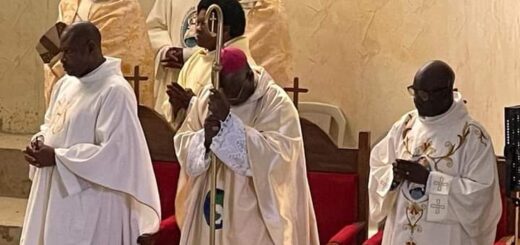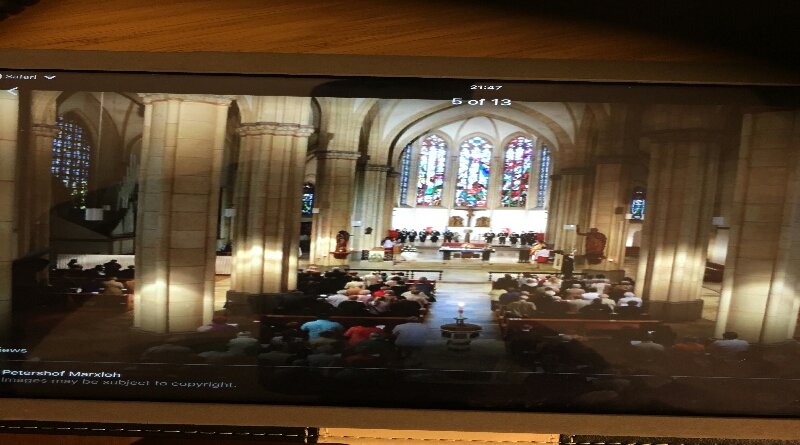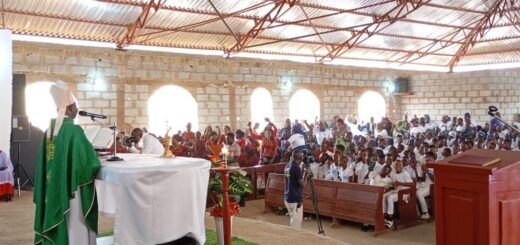Our help shall come from the Lord who made Heaven and Earth.
by ARCH BISHOP · October 16, 2022
TWENTY NINTH SUNDAY IN ORDINARY TIME, YEAR C
OCTOBER 16, 2022, ST. ANDREW’S CHAPLAINCY, NEW KUTUNKU, HOMILY BY ARCHBISHOP I. A. KAIGAMA
Readings: Ex. 17: 8-13; Ps. 120(121); 2 Tim. 3: 14-14: 2; Lk. 18: 1-8
Our help shall come from the Lord who made Heaven and Earth.
Last Sunday, our readings urged us to be grateful to God in all circumstances, and also to express thankfulness to others for the good they do. This Sunday, the readings focus on perseverance in prayer.
Moses, after sending Joshua to war against the Amalekites, made tireless intercession for victory for the Israelite army. The Amalekites were the posterity of Esau who were at enmity with Jacob over the birthright and blessing. They stood between Israel and the land God had promised them. Moses stood at the hilltop with uplifted hands. What was in the hand of Moses was the staff, the staff that changed to a snake and swallowed the serpents of the magicians before Pharaoh in Egypt; the staff with which he parted the Red Sea during their exodus from Egypt (cf. Ex. 14:16-26); the staff with which he stroke the rock and water came forth for the people of God to drink in the desert (cf. Ex. 17:1-7). As long as Moses held up his hands in prayer, Israel prevailed over the Amalekites and when his hands grew heavy and were let down, the Amalekites had the better of the fight. To support Moses, his two assistants, Aaron and Hur, seated him upon a rock and held up his arms.
What to note in the first reading is that Israel and Amalek fought all day and the people of God won through the prayer of Moses, whose hands were raised to the heavens. We see here the power of prayer, just as the Christians were granted victory over the Ottoman army at the battle of Lepanto through the Holy Rosary in 1571.
In the second reading, St. Paul encourages Timothy about perseverance in prayer, studying the word of God, the practice of the faith and preaching the good news of Jesus. Jesus in the Gospel uses the parable of the persistent widow to show us the importance of unfailing prayer. The widow was one of the marginalized in her society, an easy target of oppression and fraud as still happens in our society. However, her disadvantaged and marginalized status did not stop her in her pursuit of justice. She stood before the unjust judge with her petition, not taking ‘no’ for an answer. Her persistence in her pursuit for justice is worthy of emulation.
God’s will is at work even in a corruption ridden society, so there is hope that even in the midst of systemic corruption, justice could still be brought about. We cannot right every wrong, but we must never give up hope and stop working for the greater good. We are tasked to pray without ceasing as only God can bring about miraculous justice in a corrupt world, just as He alone can bring about healing in a sick and sinful world.
Jesus used this parable to teach us that if a poor widow could get justice from the hard hearted, uncaring old judge, then it follows that our Heavenly Father, who is loving, tender and gracious will grant us much more when we cry out to Him. When our prayers are not answered right away the Lord may be asking us to wait so that He answers in His own time and way, and so we should not give up too quickly when there is a delay.
The lessons from today’s readings:
Perseverance should be not only in prayer but also in doing good works; being civil and patriotic citizens; building healthy social relationships; working to heal past wounds, etc.
The prolonged prayer made by their leader guaranteed the victory of the Israelites over their enemies. Do our political and traditional leaders leave prayer to the ordinary people? As Moses prayed, David prayed, Solomon prayed, the king of Nineveh prayed so should our Nigerian leaders pray and work against poverty, unemployment, hunger, flood, diseases, violence and insecurity, and our help will definitely come from the Lord.
The inspired Word of God must be the guiding principles of our daily life and action. We should also rise on the wings of prayer no matter how frustrating and crippling our situations may be. Prayers should be a way of life instead of occasional moody utterances. St. Padre Pio refers to prayer as, “the oxygen of our soul.”
You are the ‘Aarons’ and ‘Hurs’ in our Archdiocese, to support the ministry and vision of your Bishops. With the crosier (pastoral staff) as a symbol of our spiritual and pastoral authority, you should support us as we guide, bless, pray with and instruct you.
I urge the Chaplain, Fr. Robert Kajoh, MSP, the 77 candidates for confirmation, and the entire people of God in St. Anselm’s Chaplaincy, New Kutunku, and indeed, all Nigerians, to persevere in prayer and to build a trusting faith in God. Like the widow, many Nigerians are being oppressed or denied justice, many teachers denied improved working conditions; many doctors and nurses frustrated and frantically relocating abroad, and those workers who remain have little job fulfillment.
Let us keep asking our Blessed Mother for her constant intercession till we gain victory over our national woes and something good happens.
GLORY TO JESUS, HONOUR TO MARY!




